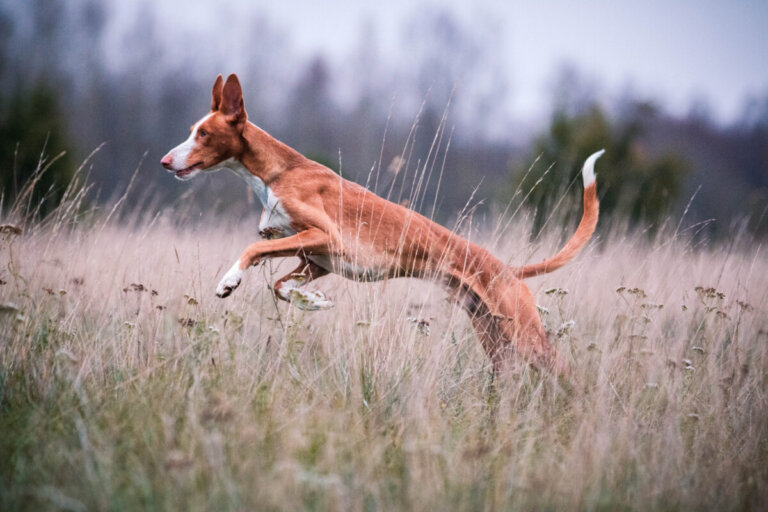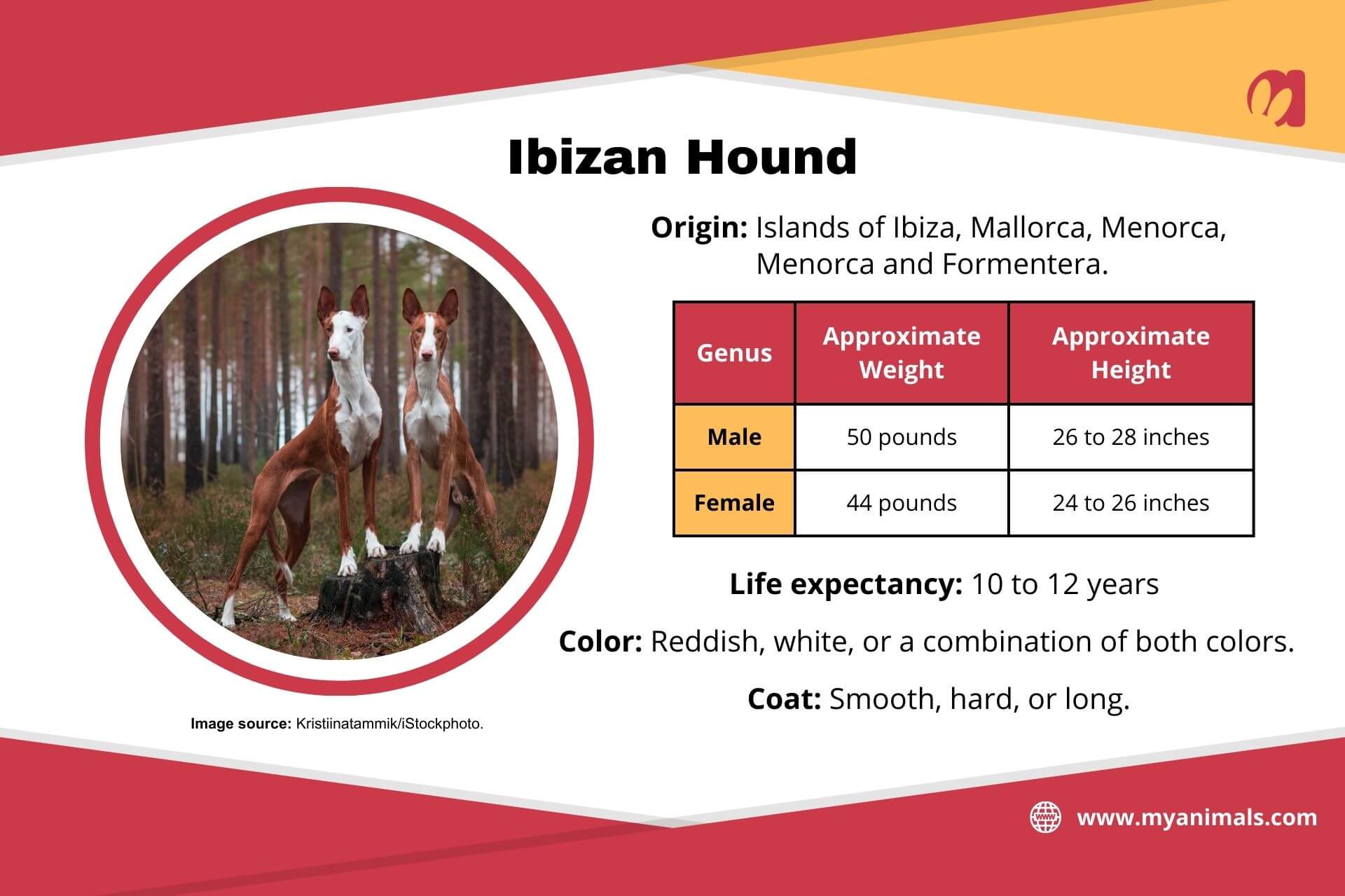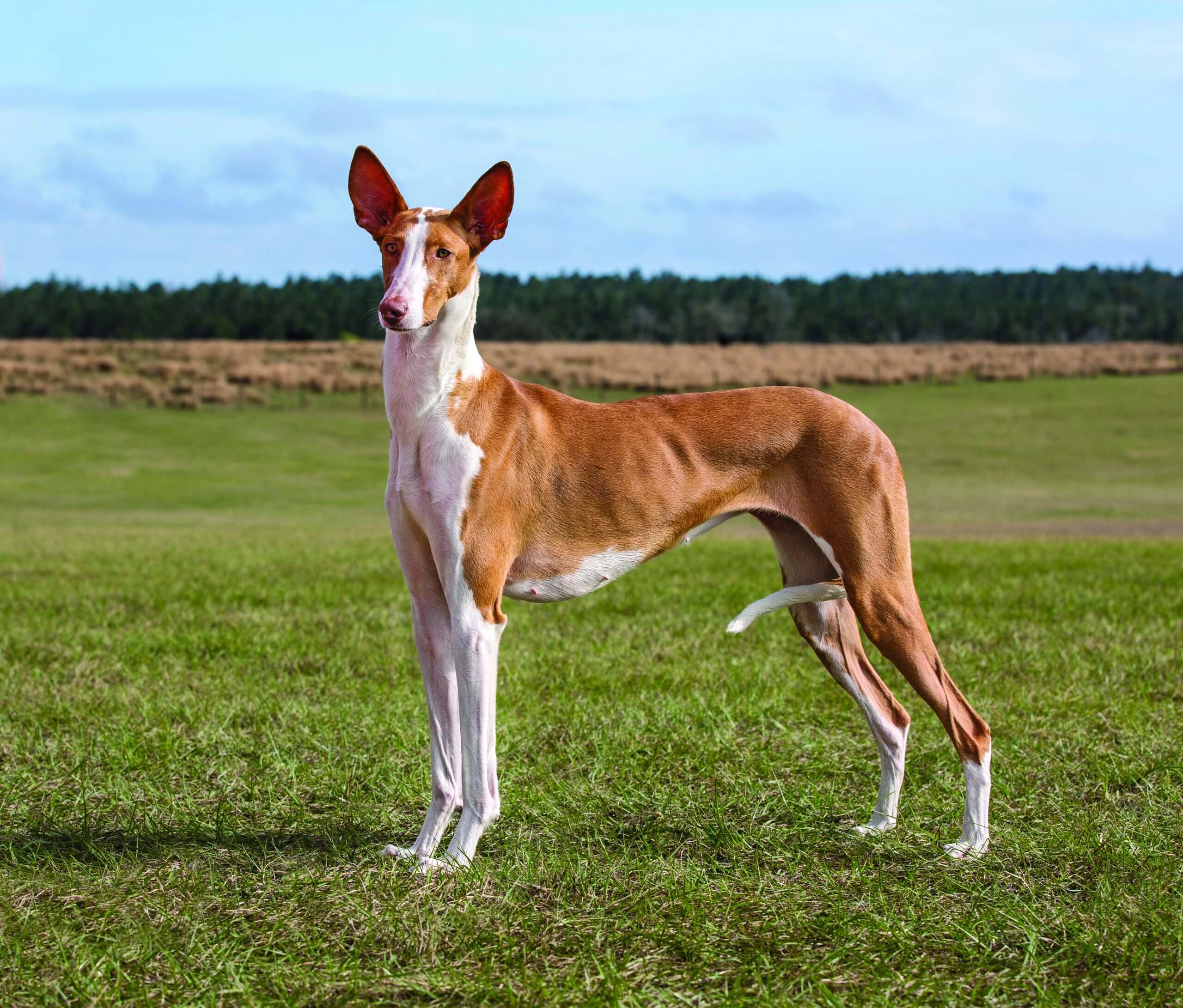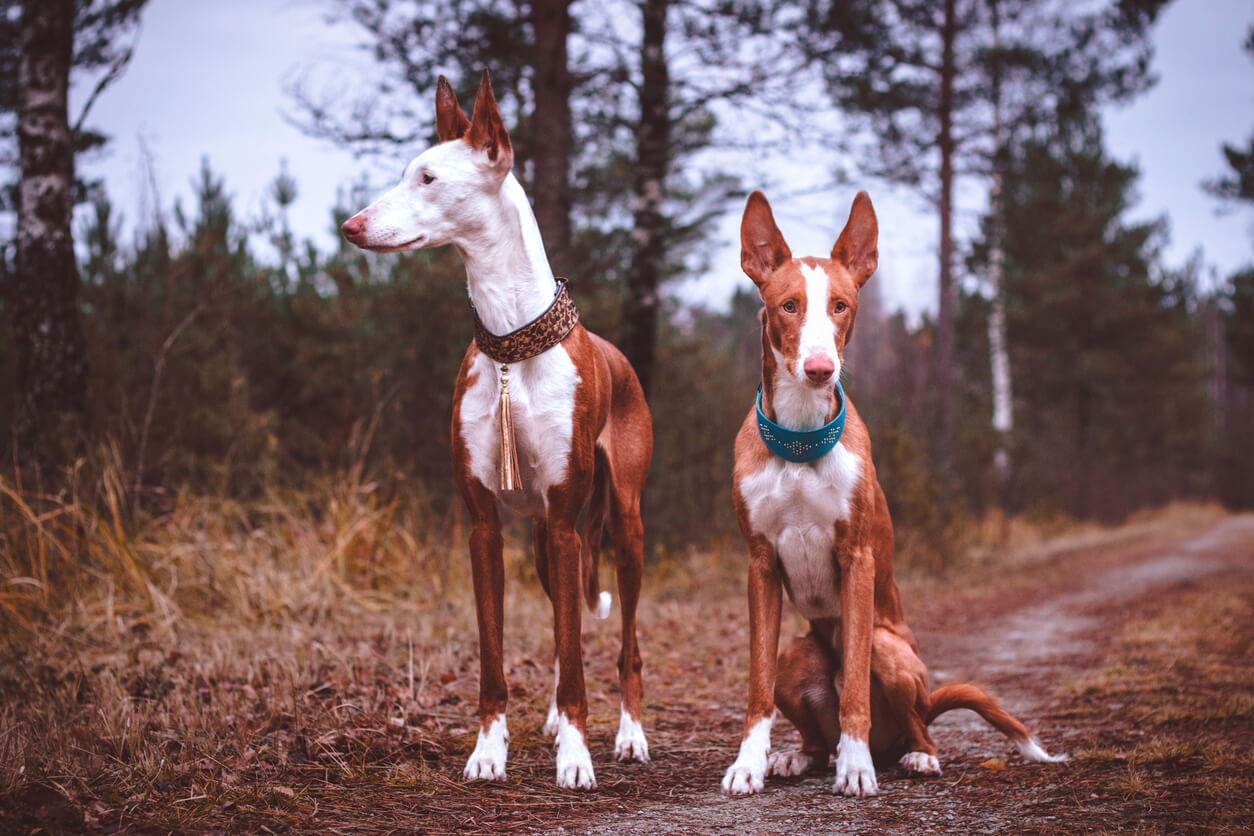The Ibizan Hound: Characteristics and Care


Written and verified by the veterinarian and zootechnician Sebastian Ramirez Ocampo
When talking about energetic, skillful, astute dogs with a great capacity for learning, the Ibizan Hound is, without a doubt, near the top of the list. Although they’re little known outside Spain, in this Iberian country, they’re very popular, especially for their hunting abilities.
Their name refers to their place of origin (Ibizan refers to coming from Ibiza) and to their working characteristics (hound).
Known as the podenco ibicenco in Spanish and Ca eivissenc in Catalan, this Spanish canine breed has some particularities that’ll make anyone want to have one in their home. Continue reading this article and discover the origins, behaviors, care, and other characteristics of this spectacular pet.
The origin of the Ibizan Hound

The breed developed on the islands of Mallorca, Menorca, Formentera, and, especially, Ibiza. According to the article The Spanish Canids. Origins and Classification, the Ibizan Hound comes from Egyptian dogs brought to the Balearic Islands more than 2,000 years ago.
It’s believed that Phoenician, Carthaginian, or Roman traders were responsible for its introduction to Spanish territory. However, it has also been suggested that their ancestors arrived much later, along with the Muslims, some 700 years ago.
Official recognition as a breed occurred in 1982, by the Fédération Cynologique Internationale (FCI). Its classification was given in group 5 (primitive dogs) and section 7 (hunting dogs). According to this entity, three varieties can be distinguished:
- Smooth coat: Of a strong and shiny appearance, but not soft.
- Wirehaired coat: Rough and well-populated.
- Long coat: Silky and 5 centimeters long.
Physical characteristics
The Ibizan Hound is a dog with a slender figure and well-proportioned body. It’s classified as a dolichocephalic dog, meaning that it has a long and flattened muzzle. It has large ears that remain upright and small amber eyes.
Both the neck and limbs are long and muscular. These are hallmarks of dogs that can move at high speeds and in thick vegetation.
The torso is slender, the chest is narrow, and the long tail stands erect. Thanks to all the above-mentioned characteristics, it’s considered an excellent hound or hunter.
As for its coat, it can be found in various shades:
- Reddish
- Brown
- White
- A combination of both colors
As adults, they reach 45 to 55 pounds in weight and 28 inches in height.

The temperament of the Ibizan Hound
As a general rule, hounds are very close and loyal to their guardians, and the Ibizan Hound is no exception. Its temperament, which is temperate, docile, and affectionate, allows it to live without problems in homes with children or where there are other dogs.
However, it’s important to socialize them from an early age in order to avoid aggressive behavior in adulthood.
Among other things, it responds very well to positive training, as it stands out for its capacity for learning and cunning in different activities. This is a trait inherited from its ancestors, who were also hunters.
On the contrary, it doesn’t usually learn commands if the reinforcement is negative, for example, based on scolding and blows. In addition, it’s a very energetic and active breed, so it needs constant stimulation to avoid boredom.
Although it could be thought that it’s only suitable for living in rural environments, the reality is that it adapts well to the city, as long as it has walks and recreation.
General care
Being a rustic and resistant breed, the Ibizan Hound doesn’t require much special care. Those with short, smooth, and hard coats need a brushing every 15 days, while those with long hair need it once or twice a week.
As for bathing, once a month will be enough to keep them clean and hygienic.
According to what has been indicated, a good dose of daily exercise is essential for their physical and mental well-being. Their diet should be based on good quality concentrates, with high levels of proteins and calories that meet their nutritional needs.
It’s important to point out that, due to their body build and coat type, they’re not dogs that resist the cold. For this reason, they should be well protected during the winter season when they go outdoors.
Finally, as with any animal under the responsibility of a guardian, visits to the veterinarian should be regular. Likewise, it’s important to keep their deworming and vaccination schedule up to date to avoid unwanted diseases.
The health of the Ibizan Hound
To tell the truth, this canine breed doesn’t usually suffer from many diseases throughout its life. In fact, its life expectancy is about 10 to 12 years when provided with regular and adequate care.
However, as with other pure breeds, it can inherit certain conditions that affect its well-being. For example, according to information from the University of Prince Edward Island, the Ibizan Hound is predisposed to the following diseases:
- hip dysplasia
- deafness
- degenerative myelopathy
Likewise, eye diseases such as cataracts and vitreous degeneration may also be present in this breed.
However, a recent article in the journal Parasites & Vectors, points out that its resistance to pathogens – such as Leishmania infantum – is much higher than that of other canine breeds.
This is an important aspect, as the protozoan, responsible for the disease leishmaniasis, has a strong presence in the Mediterranean Sea region. Moreover, it can be transmitted from pets to humans. Therefore, by having a strong immune system, these types of infectious diseases are less of a concern for their guardians.

An ideal life companion
If you’re thinking of a companion animal to brighten up your life, don’t doubt that the Ibizan Hound can fulfill that role to perfection. Due to its physical and behavioral characteristics and resistance, this canine breed is apt to live in any environment and in all types of families.
However, it’s important that you remember to evaluate your economic conditions and time availability because, as you’ve been able to observe, they’re animals that require a certain degree of attention. In addition, getting advice from a trained professional before integrating this magnificent species into your home will be key to provide it with the necessary care and welfare it deserves.
When talking about energetic, skillful, astute dogs with a great capacity for learning, the Ibizan Hound is, without a doubt, near the top of the list. Although they’re little known outside Spain, in this Iberian country, they’re very popular, especially for their hunting abilities.
Their name refers to their place of origin (Ibizan refers to coming from Ibiza) and to their working characteristics (hound).
Known as the podenco ibicenco in Spanish and Ca eivissenc in Catalan, this Spanish canine breed has some particularities that’ll make anyone want to have one in their home. Continue reading this article and discover the origins, behaviors, care, and other characteristics of this spectacular pet.
The origin of the Ibizan Hound

The breed developed on the islands of Mallorca, Menorca, Formentera, and, especially, Ibiza. According to the article The Spanish Canids. Origins and Classification, the Ibizan Hound comes from Egyptian dogs brought to the Balearic Islands more than 2,000 years ago.
It’s believed that Phoenician, Carthaginian, or Roman traders were responsible for its introduction to Spanish territory. However, it has also been suggested that their ancestors arrived much later, along with the Muslims, some 700 years ago.
Official recognition as a breed occurred in 1982, by the Fédération Cynologique Internationale (FCI). Its classification was given in group 5 (primitive dogs) and section 7 (hunting dogs). According to this entity, three varieties can be distinguished:
- Smooth coat: Of a strong and shiny appearance, but not soft.
- Wirehaired coat: Rough and well-populated.
- Long coat: Silky and 5 centimeters long.
Physical characteristics
The Ibizan Hound is a dog with a slender figure and well-proportioned body. It’s classified as a dolichocephalic dog, meaning that it has a long and flattened muzzle. It has large ears that remain upright and small amber eyes.
Both the neck and limbs are long and muscular. These are hallmarks of dogs that can move at high speeds and in thick vegetation.
The torso is slender, the chest is narrow, and the long tail stands erect. Thanks to all the above-mentioned characteristics, it’s considered an excellent hound or hunter.
As for its coat, it can be found in various shades:
- Reddish
- Brown
- White
- A combination of both colors
As adults, they reach 45 to 55 pounds in weight and 28 inches in height.

The temperament of the Ibizan Hound
As a general rule, hounds are very close and loyal to their guardians, and the Ibizan Hound is no exception. Its temperament, which is temperate, docile, and affectionate, allows it to live without problems in homes with children or where there are other dogs.
However, it’s important to socialize them from an early age in order to avoid aggressive behavior in adulthood.
Among other things, it responds very well to positive training, as it stands out for its capacity for learning and cunning in different activities. This is a trait inherited from its ancestors, who were also hunters.
On the contrary, it doesn’t usually learn commands if the reinforcement is negative, for example, based on scolding and blows. In addition, it’s a very energetic and active breed, so it needs constant stimulation to avoid boredom.
Although it could be thought that it’s only suitable for living in rural environments, the reality is that it adapts well to the city, as long as it has walks and recreation.
General care
Being a rustic and resistant breed, the Ibizan Hound doesn’t require much special care. Those with short, smooth, and hard coats need a brushing every 15 days, while those with long hair need it once or twice a week.
As for bathing, once a month will be enough to keep them clean and hygienic.
According to what has been indicated, a good dose of daily exercise is essential for their physical and mental well-being. Their diet should be based on good quality concentrates, with high levels of proteins and calories that meet their nutritional needs.
It’s important to point out that, due to their body build and coat type, they’re not dogs that resist the cold. For this reason, they should be well protected during the winter season when they go outdoors.
Finally, as with any animal under the responsibility of a guardian, visits to the veterinarian should be regular. Likewise, it’s important to keep their deworming and vaccination schedule up to date to avoid unwanted diseases.
The health of the Ibizan Hound
To tell the truth, this canine breed doesn’t usually suffer from many diseases throughout its life. In fact, its life expectancy is about 10 to 12 years when provided with regular and adequate care.
However, as with other pure breeds, it can inherit certain conditions that affect its well-being. For example, according to information from the University of Prince Edward Island, the Ibizan Hound is predisposed to the following diseases:
- hip dysplasia
- deafness
- degenerative myelopathy
Likewise, eye diseases such as cataracts and vitreous degeneration may also be present in this breed.
However, a recent article in the journal Parasites & Vectors, points out that its resistance to pathogens – such as Leishmania infantum – is much higher than that of other canine breeds.
This is an important aspect, as the protozoan, responsible for the disease leishmaniasis, has a strong presence in the Mediterranean Sea region. Moreover, it can be transmitted from pets to humans. Therefore, by having a strong immune system, these types of infectious diseases are less of a concern for their guardians.

An ideal life companion
If you’re thinking of a companion animal to brighten up your life, don’t doubt that the Ibizan Hound can fulfill that role to perfection. Due to its physical and behavioral characteristics and resistance, this canine breed is apt to live in any environment and in all types of families.
However, it’s important that you remember to evaluate your economic conditions and time availability because, as you’ve been able to observe, they’re animals that require a certain degree of attention. In addition, getting advice from a trained professional before integrating this magnificent species into your home will be key to provide it with the necessary care and welfare it deserves.
All cited sources were thoroughly reviewed by our team to ensure their quality, reliability, currency, and validity. The bibliography of this article was considered reliable and of academic or scientific accuracy.
- Álvarez, L., Marín-García, P. J., & Llobat, L. (2022). Immunological and genomic characterization of Ibizan Hound dogs in an endemic Leishmania infantum region. Parasites & Vectors, 15(1), 445. https://parasitesandvectors.biomedcentral.com/articles/10.1186/s13071-022-05504-3
- Federation Cynologique Internationale (AISBL). (2000). Estándar- FCI N°89. Podenco Ibicenco. https://www.fci.be/es/nomenclature/PODENCO-IBICENCO-89.html
- Jordana, J., Piedrafita, J., & Sanchez, A. (1990). I.- Los Cánidos Españoles. Orígenes y Clasificación. One 2a, 89. https://www.researchgate.net/profile/Jordi-Jordana/publication/323013210_I-
- University of Prince Edward Island. ( 2023). CIDD Database. Ibizan hound. Consultado el 29 de junio de 2023. https://cidd.discoveryspace.ca/breed/ibizan-hound.html
This text is provided for informational purposes only and does not replace consultation with a professional. If in doubt, consult your specialist.








